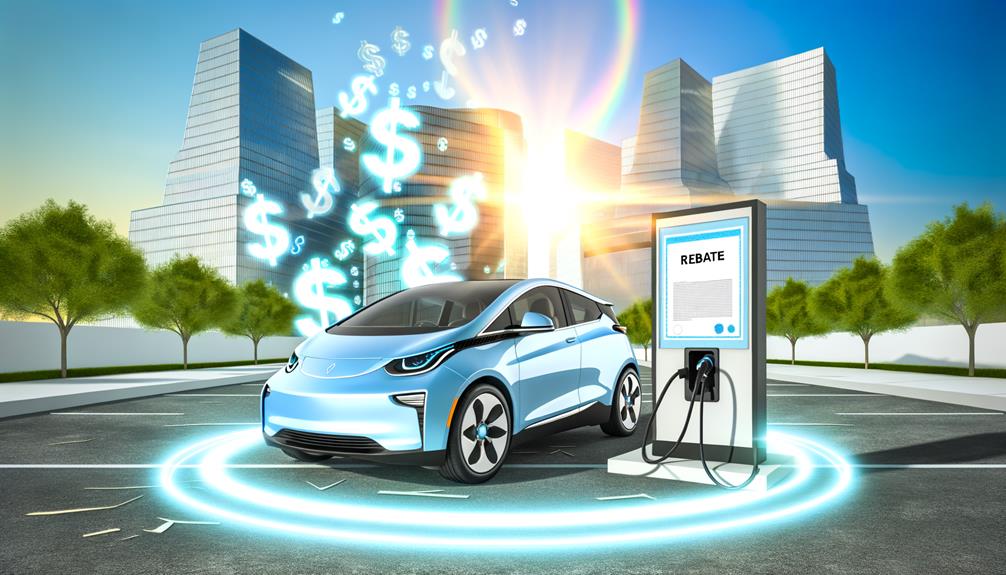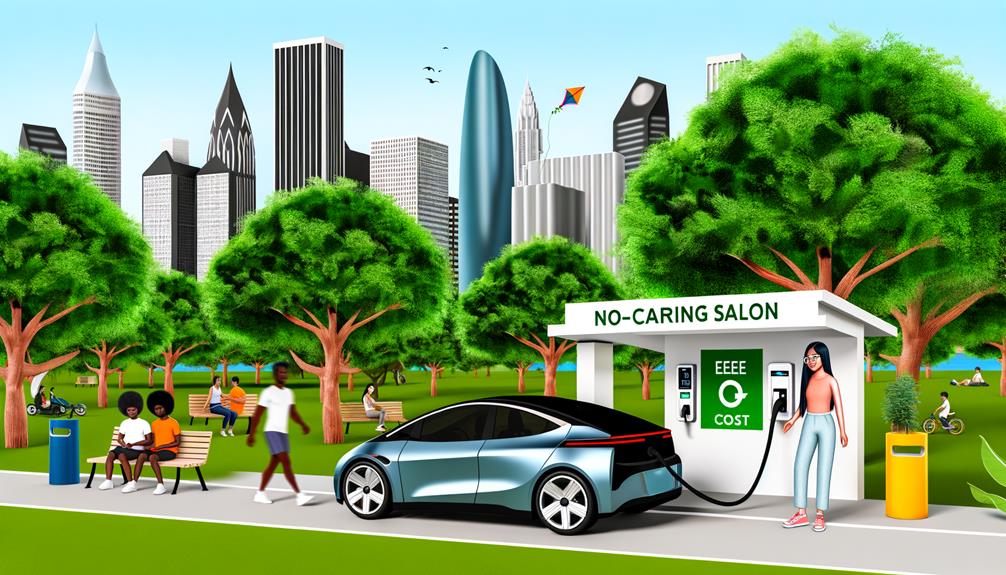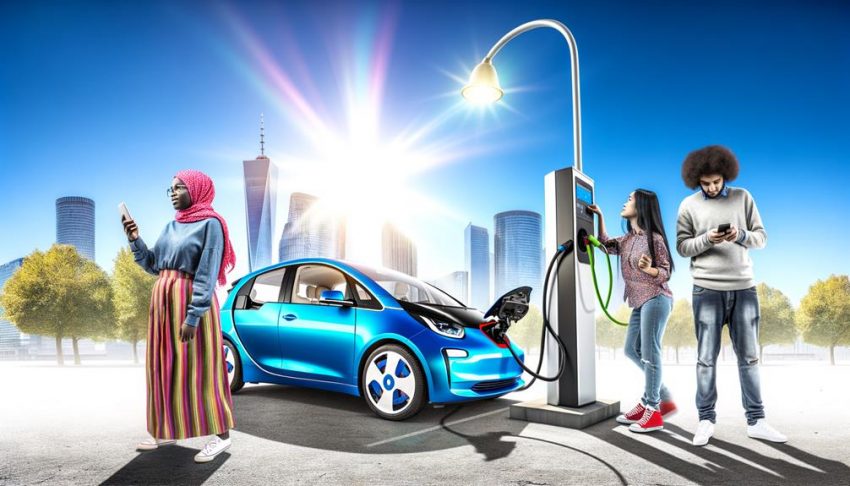When you think about charging an electric car, you might wonder if it's actually free. While some public locations like malls and universities offer complimentary charging to attract visitors, there are varying options and conditions that come into play. Networks such as Volta might provide free Level 2 charging, but they do this in exchange for displaying advertisements. You can also find free charging at certain national parks, included with your entrance fees. But how do you navigate these options effectively? And what are the hidden catches you should be aware of?
Contents
Charging Options
When it comes to charging options for your electric car, you might be pleasantly surprised at the variety of free choices available. Free charging stations are more common than you might think, especially in public spaces. Retailers, hotels, and educational institutions often provide complimentary charging for their customers or guests, making it convenient and cost-effective for you to juice up your vehicle.
One of the most popular networks offering free Level 2 charging is Volta. They provide free EV Charging Stations in exchange for displaying advertisements, allowing you to charge your car for around 30 minutes without incurring any costs. This can be particularly advantageous for quick top-offs during shopping trips or other short stops.
National parks and campgrounds also contribute to the free charging landscape. These locations may offer free charging stations to encourage EV use among visitors, sometimes including the cost within park entrance fees. It's a wonderful way to enjoy nature while keeping your car charged.
Automotive manufacturers occasionally sweeten the deal by offering free charging packages when you purchase a new electric vehicle. These packages might cover a limited duration or a specific amount of energy, reducing your charging fees and making EV ownership even more appealing.
To find free chargers in your vicinity, community resources like the PlugShare app are invaluable. This app allows you to locate free EV charging stations, filter for real-time availability, and read user reviews. It's an essential tool for any EV owner looking to save on charging fees while maximizing the convenience of public charging options.
Time of Use Rates
Understanding Time of Use (TOU) rates can be a game-changer for your electric vehicle (EV) charging costs. By charging your EV during off-peak hours, you can potentially save 20-50% on your electricity bill, especially with utility programs designed for EV owners. Smart chargers make it even easier by automatically scheduling charging during these low-rate periods, letting you optimize savings and efficiency without extra effort.
Off-Peak Charging Benefits
Off-peak charging offers electric vehicle (EV) owners a cost-effective solution by taking advantage of lower electricity rates during late-night or early morning hours. Many utility companies provide special time-of-use rates specifically designed for EV owners, which can greatly reduce your charging costs. By charging your EV during these designated off-peak times, you can achieve substantial savings on your electricity bill, often reducing costs by as much as 30% compared to peak hours.
Smart chargers make off-peak charging even more convenient. These devices can be programmed to automatically start charging your EV during off-peak periods, ensuring you maximize savings without any manual intervention. Additionally, some utilities offer demand response programs that encourage you to shift your electricity use to off-peak hours. In return, you may receive financial rewards for participating in these programs, further lowering your overall charging costs.
Special Utility Programs
Taking advantage of late-night or early morning hours to charge your EV can save you a lot of money, and many utilities have recognized this by offering special Time of Use (TOU) rates. These rates provide lower electricity costs during off-peak hours, encouraging you to charge your vehicle when the grid is less stressed.
By leveraging these special TOU rates, you can greatly reduce your charging costs, sometimes by up to 50% compared to peak pricing. Here are some key benefits:
- Savings: Charging during off-peak hours can slash your costs dramatically.
- Convenience: Many utility companies offer easy enrollment in TOU plans.
- Smart Chargers: These can be programmed to charge your EV automatically during low-rate periods, maximizing savings.
- Demand Response Programs: Some utilities provide extra incentives for reducing energy use during peak times, benefiting both you and the grid.
- Awareness: Staying informed about local TOU rates can lead to substantial savings on your electric vehicle charging stations.
Participating in these special utility programs is a smart way to manage your charging costs and support a more efficient energy grid. By taking advantage of these rates, you're not just saving money—you're also contributing to a more sustainable future.
Smart Charger Programming
Smart charger programming, particularly when utilizing Time of Use (TOU) rates, offers a practical and cost-effective solution for electric vehicle (EV) owners. By scheduling your charging during off-peak hours, you can take advantage of lower electricity rates offered by many utility companies. This not only leads to significant savings but also makes the charging process more efficient. Some utilities even provide special programs for EV owners that incentivize charging at specific times, further reducing costs.
With smart chargers, you can integrate your charging setup with home energy management systems. This allows for automated charging based on real-time electricity pricing and helps optimize your charging schedules. Aligning your charging times with periods of high renewable energy generation can also reduce overall charging costs. Imagine waking up every morning with a fully charged car and a lower electric bill because you charged overnight when rates were cheaper.
Here's a quick comparison to illustrate potential savings:
| Charging Time | Rate per kWh | Monthly Cost (Assuming 300 kWh) |
|---|---|---|
| Peak Hours | $0.20 | $60 |
| Off-Peak Hours | $0.10 | $30 |
| Smart Charging Plan | $0.08 | $24 |
Smart charger programming can make a real difference in your EV ownership experience, delivering both convenience and financial benefits.
Incentives and Rebates

Federal tax credits, state rebates, and local incentives greatly reduce the cost of owning and charging an electric vehicle (EV). When you consider these financial benefits, the overall expense of purchasing and maintaining an EV becomes much more manageable. One of the most significant incentives available is the federal tax credit, which can provide up to $7,500 for eligible EV purchases. This reduction alone can make a substantial difference in your budget.
Additionally, many states offer their own set of incentives, such as rebates or state-specific tax credits, further decreasing the cost associated with electric vehicles. These state-level programs can vary, so it's important to check what's available in your area.
Local incentives can also play an important role. These often include programs that offer discounts or even free charging options for EV owners. These benefits can be particularly attractive if you're looking to save on daily charging costs.
Here's a quick rundown of the various incentives and rebates you might encounter:
- Federal tax credits: Up to $7,500 for eligible EV purchases.
- State rebates: Additional financial incentives that vary by state.
- Local programs: Discounts or free charging options.
- Utility companies: Rebates for home charging station installations.
- Public charging grants: Encourages businesses to provide free public charging stations.
Utility companies are also getting in on the action by offering rebates for the installation of home charging stations. This not only helps offset the initial setup costs but also promotes the adoption of EVs. Finally, some municipalities implement public charging grants to encourage businesses to install charging stations, making free public charging more accessible for consumers.
Charging Networks
Charging networks can greatly impact the cost of powering your electric vehicle, with some locations offering free charging at malls, hotels, and workplaces. By joining membership programs, you can benefit from lower rates, making frequent charging more affordable. Apps like PlugShare and ChargePoint are invaluable for locating these free stations, with hundreds available across the U.S.
Membership Cost Benefits
For electric vehicle (EV) owners, joining a charging network's membership program can markedly cut down on charging expenses. By enrolling in these membership programs, you can enjoy significant savings and enhanced convenience. Electrify America, for instance, offers a plan that reduces charging costs to as low as 31 cents per kWh, which is substantially cheaper than their non-membership rates.
ChargePoint's membership programs provide additional perks, including access to exclusive charging stations and various discounts, helping you further offset your charging expenses. EVgo's Rewards program is another excellent option, allowing you to earn points for each charge, which can be redeemed for free charging sessions, making regular use of their network even more rewarding.
Here are some key benefits of joining a charging network's membership program:
- Reduced charging costs: Lower per kWh rates compared to non-members.
- Exclusive access: Special charging stations only available to members.
- Discounts: Various discounts that reduce overall charging expenses.
- Free charging: Earn points or rewards that can be redeemed for free charging.
- Enhanced EV ownership experience: Access to more charging locations and faster options.
These benefits collectively enhance your EV ownership experience, making the journey more economical and convenient.
Free Charging Locations
Maneuvering the landscape of free charging locations for your electric vehicle can be both exciting and highly beneficial. Many charging networks, like Volta, offer free Level 2 charging at their stations. With these, you can gain approximately 35 miles of range in just 30 minutes. Public charging apps such as PlugShare and ChargePoint are invaluable tools to help you find chargers. They often locate free charging stations at malls, grocery stores, and universities.
Businesses, including large retail chains like Whole Foods and select hotels, provide complimentary charging as a customer incentive. This means you can charge your vehicle while you shop or enjoy a hotel stay. National parks are also stepping up, offering over 140 free charging stations across 23 parks, which promotes eco-friendly travel.
Automakers sometimes include free charging packages as part of their vehicle purchase incentives. This can make electric vehicle ownership even more appealing by providing you with access to public EV charging without additional costs. So, whether you're running errands, traveling, or just exploring, there are plenty of opportunities for free EV charging, making it easier and more economical to drive electric.
Finding Free Charging Stations

Steering through the world of electric vehicle (EV) ownership can be made considerably easier by knowing where to find free charging stations. As an EV driver, you'll discover that many public charging stations offer free charging, particularly in convenient locations like malls, grocery stores, universities, and some public transit stations. These spots are perfect for topping up your battery while you go about your daily activities.
To find charging stations easily, you can rely on various charging apps. Apps like PlugShare and ChargePoint provide real-time information on the availability of free electric vehicle charging spots and even include user reviews to help you choose the best options.
Here are some common places where you can locate free charging stations:
- Malls: Many shopping centers offer free charging to attract environmentally-conscious shoppers.
- Grocery Stores: Chains like Whole Foods often have complimentary charging stations available.
- Universities: Several campuses provide free charging as part of their green initiatives.
- Public Transit Stations: Some transit hubs offer free charging to encourage the use of public transportation.
- National Parks: Over 140 chargers are available across 23 parks, often included with park entrance fees.
Additionally, some businesses and hotels offer free charging as a perk to attract customers. For instance, select locations of Macy's and Marriott hotels provide complimentary charging for their patrons.
Lastly, automakers frequently include free charging incentives with the purchase of specific EV models. This not only enhances the appeal of electric vehicles but also makes it easier for you to maintain your car's charge without additional costs.
Benefits of Free Charging
Why should you consider taking advantage of free charging stations for your electric vehicle? Free charging can greatly reduce your EV's operating costs, allowing you to save money while enjoying the numerous benefits of electric vehicle ownership. By utilizing free charging stations, you can cut down on one of the primary expenses associated with EVs—electricity—making your change to greener transportation more economical.
Many retailers and commercial establishments, including Whole Foods and select hotels, offer free charging to attract customers. This creates a win-win situation: you get to charge your EV at no extra cost, and the businesses benefit from increased foot traffic. Additionally, using free charging stations while shopping or dining enhances the convenience of running errands. Imagine topping up your vehicle's battery without the worry of additional costs while you're busy with other tasks.
With over 400 free charging stations available across the U.S., often situated in public places like malls, universities, and national parks, the wide accessibility of these stations promotes broader EV adoption. The presence of free charging stations in such diverse locations helps normalize EV usage and supports a more sustainable future.
Furthermore, companies like Volta and some automakers offer free charging options as considerable incentives for consumers considering the switch to electric vehicles. These incentives provide a substantial boost in making the idea of owning an EV more attractive, further supporting the change to greener transportation.
Frequently Asked Questions
How Much Does It Actually Cost to Charge an Electric Car?
Charging costs for an electric car depend on electricity rates and charging speed. Home charging is cheaper, especially with off-peak rates or solar power. Public charging stations often cost more. Cost comparison shows home charging is usually more economical.
Do Electric Cars Get Free Charging?
Yes, electric cars can get free charging at public charging stations, workplace charging spots, and through charging incentives. Membership benefits and EV promotions from charging networks also offer free charging. Home charging and solar charging aren't typically free.
Is It Free to Charge Your Electric Car at Target?
Yes, at some Target locations, you'll find free EV charging stations. Check apps like PlugShare for charging station locations. This aligns with Target's partnerships and environmental impact goals, enhancing your shopping experience while benefiting from electric car benefits.
Is Charging an Electric Car Cheaper Than Gas?
Charging an electric car is typically cheaper than gas due to lower utility rates and local incentives. You'll benefit from electric car savings on maintenance expenses, long-term costs, and fuel comparison, despite higher charging station prices and efficiency ratings.
Conclusion
Ultimately, charging your electric car doesn't have to break the bank. By exploring various charging options, utilizing time-of-use rates, and taking advantage of incentives and rebates, you can greatly reduce costs. Charging networks and public charging apps make finding free stations easier than ever, from malls to national parks. Embracing these opportunities not only saves you money but also supports greener transportation. So, take advantage of free charging and enjoy the benefits of eco-friendly driving.
